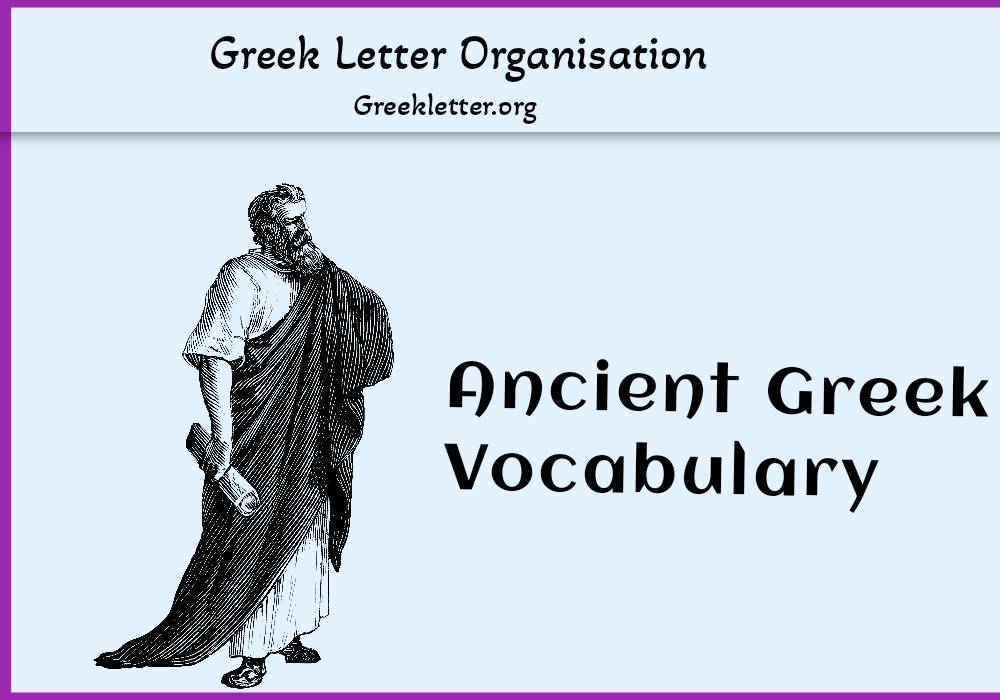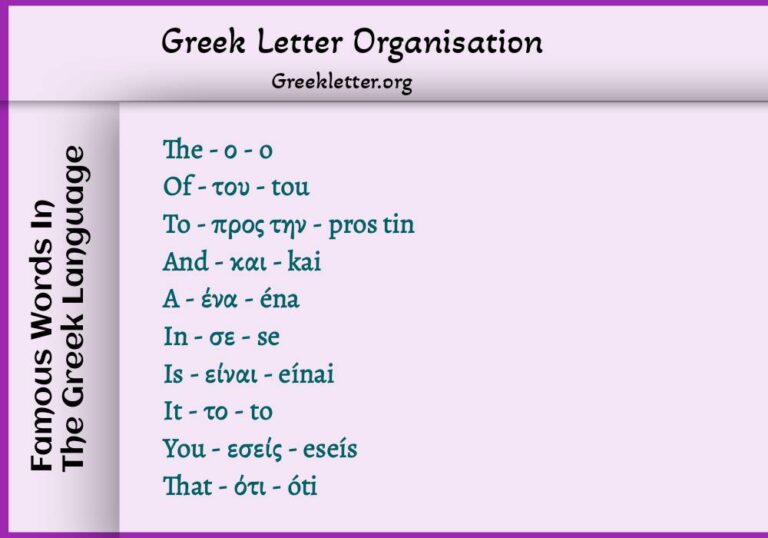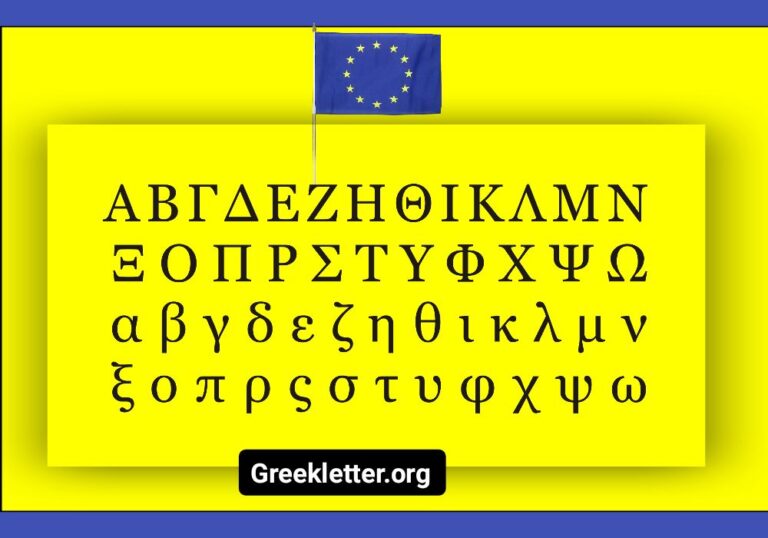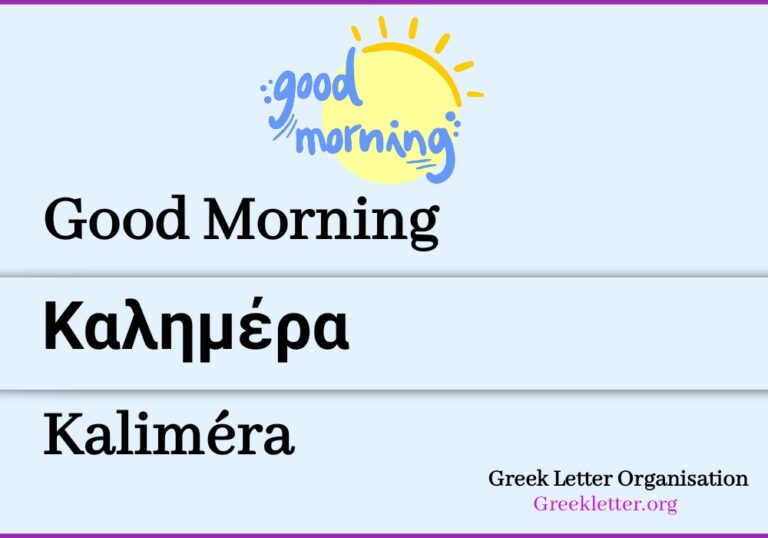Ancient Greek Vocabulary List: From Old Language
Are you searching for an ancient Greek vocabulary list? Don’t worry! The best solution here. Please scroll down.
Greeketter.org is the perfect way to learn the Ancient Greek language. With our comprehensive vocabulary list from the Old Language, you can quickly and easily learn all the words you need to know.
GLO makes learning fun and easy, so you can focus on enjoying yourself while exploring Greece’s beautiful country!
Ancient Greek Vocabulary List
(Ancient Greek – English Phonics – Meaning)
- βάβω/μπάμπω – vávo/bámpo – paint/paint
- βαγένι – vagéni – pelvis
- βάλτος – váltos – swamp
- βαρδάρης – vardáris – bardarian
- βερβερίτσα – ververítsa – barberry
- βίδρα – vídra – otter
- βίτσα – vítsa – pizza
- βλάχος – vláchos – bumpkin
- βοεβόδας – voevódas – Voivodeship
- βολοδέρνω – volodérno – I’m kicking ass
- βρικόλακας – vrikólakas – vampire
- γιάφκα – giáfka – yafka
- γκλάβα – nkláva – glava
- γκλαβανή – nklavaní – glavana
- γκορτσιά – nkortsiá – girls
- γουστερίτσα – gousterítsa – sweet girl
- ζαβλακώνομαι – zavlakónomai – I’m struggling
- ζαλίκι – zalíki – dizzy
- καρβέλι – karvéli – loaf
- κλούβιος – kloúvios – addle
- κόρα – kóra – crust
- κόσα – kósa – something
- κοτσάνι – kotsáni – stalk
- κοτσίδα – kotsída – tress
- κουνάβι – kounávi – ferret
- κούρκος – koúrkos – turkey
- κουρνιάζω – kourniázo – perch
- κουτάβι – koutávi – puppy
- λακκούβα – lakkoúva – puddle
- λόγγος – lóngos – Long
- λούτσα – loútsa – pike
- μαγούλα – magoúla – cheeks
- μαζούτ – mazoút – fuel oil
- μόρα – móra – mora
- μουντός – mountós – hazy
- μπαλαμούτι – balamoúti – balamouti
- μπάρα – bára – bar
- μπέμπελη – bémpeli – babe
- μπουχός – bouchós – chubby
- μπράτιμος – brátimos – bratimo
- μπροστέλα – brostéla – brostella
- ντόμπρος – ntómpros – outspoken
- πάπρικα – páprika – paprika
- πέστροφα – péstrofa – trout
- πλάβα – pláva – harm
- πογκρόμ – ponkróm – pogrom
- πρόγκα – prónka – proga
- ραβάνι – raváni – ravani
- ραβασάκι – ravasáki – love letter
- ρεκάζω – rekázo – I’m talking
- ρήσος – rísos – rice
- ρούχο – roúcho – clothing
- σανός – sanós – hay
- σβάρνα – svárna – harrow
- σέμπρος – sémpros – sempros
- στούμπος – stoúmpos – stump
- τζόρας – tzóras – Joras
- τραντάζω – trantázo – shake
- τρόικα – tróika – troika
- τσαντίλα – tsantíla – vexation
- τσάρος – tsáros – tsar
- τσέλιγκας – tsélinkas – tzeliga
- τσίπα – tsípa – chip
- τσίτσα – tsítsa – chicks
- χουγιάζω – chougiázo – I’m hunkering down
10 Words You Need to Know to Sound Like a True Ancient Greek
If you want to sound like a true ancient Greek, there are ten words you need to know:
- “Aristotle,” who was a famous philosopher from Greece.
- “Socrates,” who was also a famous philosopher from Greece.
- “Plato,” who was a student of Socrates.
Fourth is “Zeus,” the king of the gods in Greek mythology. Fifth is “Apollo,” the god of the sun and music. Sixth is “Dionysus,” the god of wine and parties. Seventh is “Hermes,” the messenger god. Eighth is “Odin,” the king of the gods in Norse mythology. Ninth is ” Thor,” the god of thunder in Norse mythology. The tenth is “Loki,” the trickster god in Norse mythology.
Vocabulary LIST: The Difference Between Classical and Koine Greek
Two types of Greek are commonly studied- Classical Greek and Koine Greek. Though both are forms of the same language, there are some important differences between the two.
Classical Greek is the form of the language that was used during the Golden Age of Greece. This period saw some of history’s most famous works of literature, philosophy, and science. The grammar and vocabulary of Classical Greek are very different from that of modern Greek or any other language.
Koine Greek is a more simplified form of language developed during the Hellenistic period. It became the lingua franca of the Mediterranean world and was used by writers such as Plato and Aristotle. Koine Greek is much closer to modern Greek than Classical Greek, making learning easier for students.
How To Speak Like Socrates: A Comprehensive Vocabulary List
If you want to sound like one of the most famous philosophers of all time, you’ll need to know how to speak like Socrates. Here’s a comprehensive list of vocabulary words to help you do that.
Socrates was known for using irony, so start by adding words like “irony” and “sarcasm” to your vocabulary. Other important Socrates-esque words include “philosophy,” “rational,” and “logical.” Use these words when discussing complex topics or ideas.
To sound like Socrates, pay attention to the way you talk. Speak slowly and deliberately, using simple words and short sentences. This will make you sound smart and thoughtful, just like the great philosopher himself.
Make quick progress with this list of essential ancient Greek words.
If you want to progress with your ancient Greek studies quickly, this list of essential words is a great place to start. Mastering these words will give you a strong foundation to build your vocabulary and understanding of the language.
This list includes basic words and phrases you’ll need for everyday conversation. You can use them confidently in your conversations with just a little practice. So what are you waiting for? Get started today and see how quickly you can make progress!
Conclusion Points
The ancient Greek vocabulary list presented here is drawn from various sources. It includes both common words that were used daily as well as more specialized terms that were used in particular contexts.
The incomplete list covers some of ancient Greece’s most important words and concepts.
In conclusion, this article has been very helpful in providing a list of ancient Greek vocabulary words. Please write in the comment box if you found this article helpful. Thank you for reading!
FAQs
1. What is Ancient Greek?
Ancient Greek refers to the Greek language used during the classical period from around the 9th century BC to the 6th century AD.
2. How different is Ancient Greek from Modern Greek?
Ancient Greek and Modern Greek are significantly different. While they share some similarities, Ancient Greek has a more complex grammatical structure and a different vocabulary.
3. Why should I learn Ancient Greek?
Learning Ancient Greek can help you gain insights into ancient literature, philosophy, and history. It also provides a strong foundation for understanding the development of Western civilization.
4. Can I use Ancient Greek in everyday life?
Since Ancient Greek is no longer spoken, it is not practical for everyday communication. However, it can be useful for academic purposes or if you are interested in ancient texts.
5. Are there any online resources available for learning Ancient Greek?
Yes, several online courses, dictionaries, and grammar guides can assist in learning Ancient Greek. Some websites even offer interactive exercises and forums for practicing with others.
6. How long does it take to become proficient in Ancient Greek?
The time required to become proficient in Ancient Greek varies depending on your dedication and prior knowledge of other languages. On average, proficiency may take several years of consistent study.
7. Is it easier to learn Ancient Greek if I already know another language?
Knowing another language can be advantageous when learning Ancient Greek, as many concepts will be familiar. However, due to its unique grammar and vocabulary, it still requires dedicated effort to master.
8. Can I read famous ancient works like Homer’s Iliad or Plato’s dialogues in their original language after learning Ancient Greek?
Yes! One of the main benefits of learning Ancient Greek is reading classical literature in its original form without relying on translations. This allows for a deeper understanding of the nuances present in these seminal works.






